Congress, Michigan Legislature Asked to Fix Leaks in Great Lakes Compact

by Steve Kellman
Circle of Blue
It’s been more than a year since eight states agreed to prevent large-scale diversions from the Great Lakes, the most abundant source of clean freshwater on the planet. The passage of the Great Lakes-St. Lawrence River Basin Water Resources Compact, completed after ten years of campaigning by public interest organizations, legislative leaders, and governors of both parties, was meant to permanently secure the globally significant storehouse of water contained in the Great Lakes.
Even while the legislation was navigating the necessary steps to become federal law—securing approval in eight states, Congressional passage, and an October 3, 2008 signature by President George Bush – critics asserted that several of its main provisions would allow so-called “small diversions.” They also argued that other provisions were too weak to achieve the law’s far-reaching goal of prohibiting large diversions. “Anybody could run a semi-truck through these loopholes,” Rep. Bart Stupak D-Mich. said in 2008, several weeks after the compact was enacted.
Now Congress and the Michigan Legislature are considering separate federal and state proposals to close those gaps. Last June, Rep. Stupak introduced a House resolution to clarify that the compact prohibits Great Lakes water from being sold, diverted or exported outside of the basin. The resolution was referred to the House Judiciary Committee’s Subcommittee on Commercial and Administrative Law on July 23, where it remains.
“My concerns remain that the Great Lakes Compact is not strong enough to protect against water diversions through privatization, commercialization and exportation,” Stupak told Circle of Blue. “I will continue to work with my colleagues in Congress to clarify language in the Great Lakes Compact to expressly prohibit Great Lakes water from being sold, diverted or exported outside of the Great Lakes basin to move this resolution forward.”
In the Michigan Legislature, Rep. Dan Scripps, a Democrat who represents four northwest Lake Michigan coastal counties, wants to go further. On Sept. 9, Rep. Scripps introduced a bill to establish that groundwater and Great Lakes’ water are a “public trust.” The same day he referred the bill—House Bill 5319—to the House Great Lakes and Environment Committee.
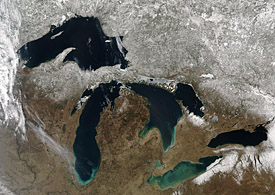
Rep. Scripps told Circle of Blue that action on the bill was delayed by the struggle to agree on a budget for a state that has had the nation’s highest unemployment rate for three straight years. Rep. Scripps expects that Congress will continue reviewing it early next year. While Scripps said he was excited when the Great Lakes Compact was implemented, it prompted him to wonder whether it went far enough in protecting the rest of the state’s water.
“Groundwater, surface water, Great Lakes water—these are public resources that should be protected in the future,” Scripps said. “If an individual uses resources to the extent that they’re put in jeopardy, there should be a legal framework to protect them.”
The Great Lakes Compact regulates drainage of the six lakes by the U.S. and Canada and requires both countries to promote water conservation throughout the region. The two Canadian provinces that border the Great Lakes—Ontario and Quebec—passed similar legislation in 2005.
The drive for legal protection was prompted by a Canadian company’s 1998 scheme to ship tankers filled with Lake Superior water to Asia. While the Canadian government initially approved the plan, public outcry forced the government to back down. It also prompted a cross-border review of the protections in place for the Great Lakes—a review that led to the compact’s creation.
Approved by Congress in the fall of 2008, the Great Lakes Compact prohibits taking large volumes of water out of the lakes or its tributaries for use outside the Great Lakes Basin, the 290,000-square-mile area whose waters and runoff feed into the lakes. The basin includes parts of Illinois, Indiana, Michigan, Minnesota, New York, Ohio, Pennsylvania and Wisconsin.
The compact requires each state to monitor and regulate large-scale water withdrawals and develop water conservation policies. It lets each state decide whether to allow bulk exports of water in containers smaller than 5.7 gallons, such as bottled water.
Jim Olson, an environmental attorney from Traverse City, Michigan, and one of the foremost authorities in the Midwest on water law, told Circle of Blue that the Stupak resolution and the Scripps proposal will effectively close the compact’s loopholes.
“It’s more than the bottled water loophole,” Olson said. “I’m concerned about the loophole for water to be exported as a product under the definition of diversion.”
As Olson explained it, water itself is defined as a product under the compact, a definition that leaves the door open to large-scale as well as small-scale diversions. “There’s no limit, he said. “On the one hand you have diversion and on the other you have an unlimited amount of water and unlimited size containers that can be shipped out of here if it’s called a product.”
The Scripps bill, Olson said, “declares to the world and any person or company in any country that water in Michigan is a public resource held as a public trust.” The public trust doctrine, which dates back to ancient Roman law, states that certain resources like water are preserved for public use and that the government has a responsibility to protect them. By invoking the public trust doctrine for all Michigan waters, including its groundwater, Scripps’ legislation would keep it from being diverted for private profit and help protect it from overuse.
“The legislation may appear to be small, but in fact it’s substantial,” Olson said.
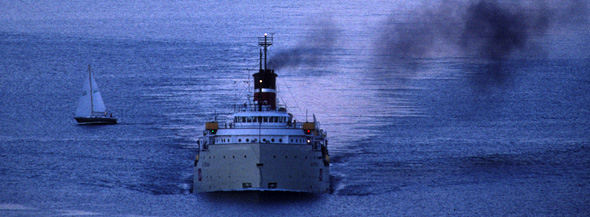
Olson represented Michigan Citizens for Water Conservation in its successful legal challenge to Nestlé Waters when the company sought to pump more water from a Michigan stream and lake for its Ice Mountain bottled water plant. He also serves as acting chairman of FLOW for Water, a coalition of Midwestern citizen groups working to prevent water withdrawals from the Great Lakes basin.
FLOW for Water is working to pass legislation similar to the Scripps bill in all eight Great Lakes states, Olson said.
But the Scripps bill also has critics. Russ Harding of the Mackinac Center for Public Policy, a free market think tank based in Midland, Michigan, wrote in a Nov. 9 column that the bill threatens the “right to own and use private property.”
Harding, former Director of the Michigan Department of Environmental Quality under Republican Governor John Engler, is Director of the Mackinac Center’s Property Rights Network.
“Like most states east of the Mississippi River,” Harding wrote, “Michigan is a riparian water-use state. In Michigan, if you own the land, you own the water and have a legal right to use that water as long as you do not interfere with the reasonable use of water by your neighbors. This has been true since the state was first settled.”
Olson dismisses the argument that Scripps’ bill infringes on property rights.
“There is no property right in water, period,” he said. “The landowner can use it for anything that’s a reasonable use, but they don’t own the water; they only have a right to use it. And that right to use has never extended to the public trust interests of water. … Nowhere in Scripps’ legislation does it limit the use of water by anybody, just the violation of transfer and sale, the violation of public trust.”
Read more about Scripps’ legislation here. See Circle of Blue’s coverage on other developments in Michigan regarding the state’s freshwater.

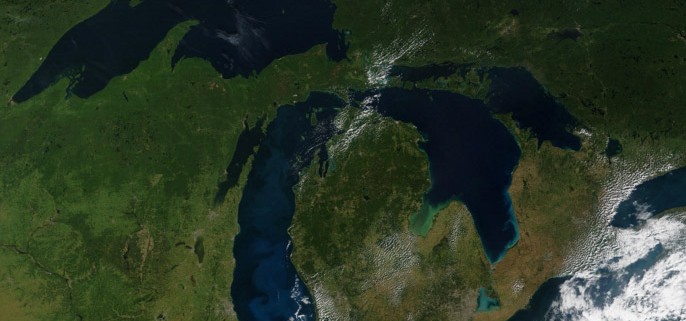
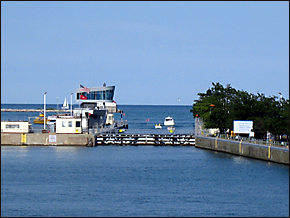





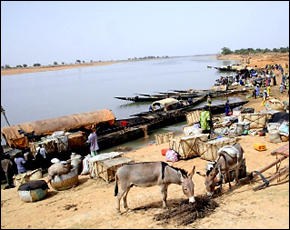
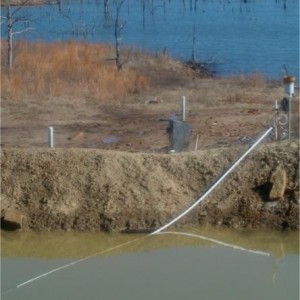
Leave a Reply
Want to join the discussion?Feel free to contribute!